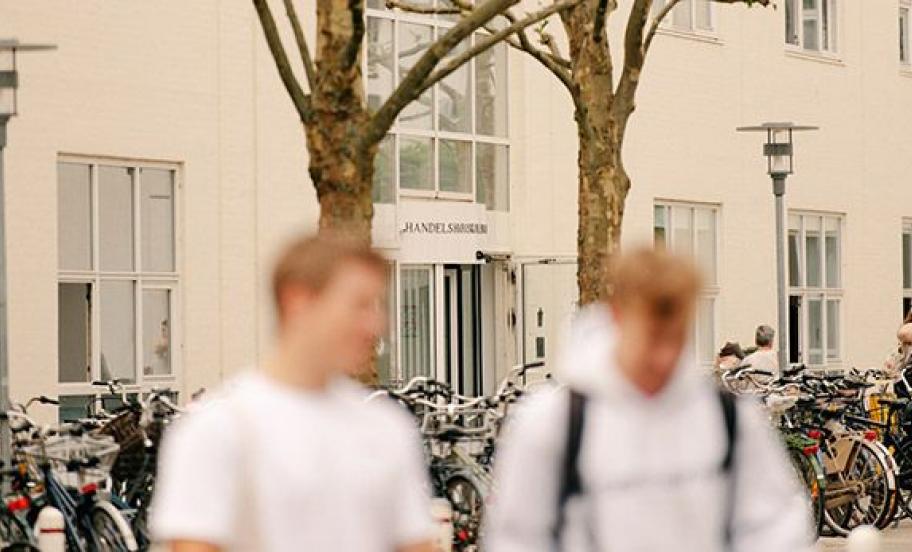BSc in International Shipping and Trade
The BSc Shipping provides you with an understanding of the context and strategies of the global shipping industry and prepares you for efficiently planning and managing shipping operations.

Om BSc in International Shipping and Trade
Why choose BSc Shipping
HEAR ABOUT THE PROGRAMME
Get an insight into what BSc Shipping is all about and what you will learn during the programme.
The world moves by sea
Ninety percent of world trade travels by ship. Every day, goods, energy, and raw materials cross oceans - linking producers, markets, and people. Behind this vast network lies the global shipping industry: a complex, competitive, and fast-moving business shaped by economics, law, logistics, and technology.
BSc Shipping gives you an understanding of this industry and its role in global commerce. You learn how markets are structured, how companies make strategic and financial decisions, and how global trade, regulation, and sustainability challenges shape the maritime economy.
Shipping is a business
You gain a broad understanding of international business with a focus on the shipping industry. You explore how global trade works in practice — from the economics behind freight markets and fuel prices to the financial choices involved in buying or operating a ship. You also examine how factors such as international politics, global conflicts, and changing regulations affect trade routes and shipping costs, influencing business decisions across the industry.
STUDENTS SHARE THEIR INSIGHTS
Amanda, Hans and Astrid share their thoughts about BSc Shipping.
The global shipping market
You study how shipping companies form strategic alliances and manage global supply chains. You also learn how companies position themselves in competitive markets and how business networks connect ports, carriers, and logistics providers worldwide. Questions such as whether to invest in large vessels that can carry more cargo or smaller ships that can access more ports illustrate the complex decisions managers face in balancing strategy, cost, and efficiency.
Navigating law and risk
You are introduced to maritime contracts and international conventions that shape the industry. You learn how international maritime law affects contracts, how fuel prices and interest rates influence costs and profitability, and how logistics and risk management help prevent accidents and delays.
You also explore how companies plan profitable routes, respond to market fluctuations, and make long-term strategic choices in a constantly changing global environment.
Learning by doing
You gain practical experience throughout the programme. In your second year, you spend the first half in Copenhagen and the second half in Singapore, Hong Kong, or Greece, experiencing how shipping operates in major global hubs. In your third year, you combine your studies at CBS with an internship in a shipping company, gaining hands-on experience with operations and management and applying your academic knowledge to real business practice.
Come to Open Days
Visit us for Open Day and learn more about which programmes might be the right fit for you. You can also meet our students and talk to our staff.
The programme is the same for both events, so you can attend on the day that suits you best.
We look forward to seeing you!

Opbygning
Økonomi og matematik
You will learn about international shipping economics and financial conditions and costumer relations in shipping companies and how they affect operations and decision making.
Handel og logistik
You will learn about how international trade affects the shipping industry and how the companies adapt to international business challenges.
Organisation og ledelse
You will learn about operations, organization and customer relations in a global and intercultural business environment.
Innovation og iværksætteri
You will learn about how shipping companies are constantly developing their services and strategies to adapt to changing demands and market conditions.
Politik
You will learn about how political and legal regulation affects a highly globalised industry.
Programme overview
1. semester
2. semester
3. semester
4. semester
5. semester
6. semester
Mandatory exchange and internship
Exchange
You will spend your second year together with students from Singapore, Hong Kong and Greece. You will spend the first half year in Copenhagen, and the second half in either:
- Singapore Management University or Nanyang Technical University in Singapore
- Hong Kong Polytechnics in Hong Kong
- University of Piraeus in Greece
Internship
On your third year, you will combine your studies at CBS with an internship in a shipping company. This will give you hands-on experience with shipping operations and enable you to embark on a career in shipping.
Options during the programme
Options during the programme (Panel content)
Electives
On your 3rd semester you can choose an elective that support your specific interest. CBS offers a large number of electives within a wide range of topics. You can also choose to the elective at other Danish universities. The elective you choose have to be relevant for your programme. See the current selection of CBS electives Courses at bachelor level.
On your 4th semester, you choose an elective at your host university in Hong Kong, Singapore, or Greece.
Global Supply Chain and Logistics Management
You can apply for Global SCLM which is a programme focusing on international business, global logistics and supply chain management. If you get selected you will spend a semester each in Copenhagen and at two partner universities:
- The Chinese University of Hong Kong, CUHK in Shenzhen, China
- The University of British Columbia, UBC in Vancouver, Canada.
Please note that this option only is available to a very limited number of students.
Read more about Global SCLM on the tab above.
Global Supply Chain and Logistics Management (Panel content)
Global Supply Chain and Logistics Management
Global Supply Chain and Logistics Management, SCLM, is a tri-continental programme focusing on a combination of international business, global logistics and supply chain management.
The programme is a collaboration between
- Copenhagen Business School
- The Chinese University of Hong Kong (CUHK) in Shenzhen
- The University of British Columbia (UBC) in Vancouver
Together with 44 other undergraduate students from three continents, you will strengthen your academic skills and gain first-hand experience in an ambitious, multicultural environment. You will face both cultural and academic challenges while exploring global opportunities.
Read more at the Global Supply Chain and Logistics Management webpage.
Who can apply?
Each of the three universities will select 15 undergraduate students to form a group of 45 students.
In the selection process, we take the following into consideration:
- grades
- interview performance
- personal motivation and achievements.
The programme is only open to CBS students from BSc Shipping and BSc IB.
Programme structure
During the 18 months you will study at CBS and the two partnership universities, experiencing life both as a host and a visitor.
You will spend your:
- third semester at Copenhagen Business School
- fourth semester at The University of British Columbia in Vancouver, Canada.
- fifth semester at The Chinese University of Hong Kong
When to apply?
The application deadline is 1 January at the end of your first semester.
Programme overview
1. semester
2. semester
3. semester
4. semester
5. semester
6. semester
Come to Open Days
Visit us for Open Day and learn more about which programmes might be the right fit for you. You can also meet our students and talk to our staff.
The programme is the same for both events, so you can attend on the day that suits you best.
We look forward to seeing you!

Studiemiljø
Close-knit environment
BSc Shipping is a small programme with around 70 students starting each year. That means everyone gets to know each other both in and outside of class, and often across cohorts. It is a friendly and welcoming environment where people support one another.
It is not uncommon to see students hanging out over a beer, chatting about cargo volumes, port regulations, or ship capacity. The study environment is driven by shared interests and curiosity.
Build a network
The shipping industry is tightly connected and built on collaboration across companies. That means you and your fellow students are likely to cross paths again in your future careers. So from day one, there is a strong focus on building lasting relationships and professional networks - both for now and for what comes next.
Read more about student life at CBS.
What the students think
Hear how Amanda, Hans and Astrid experience their student life on BSc Shipping
Mød de studerende
Teaching and exams
Teaching activities
You will have lectures with your whole year and smaller exercise classes. In the lectures, you are introduced to the theories and models you need to learn. In the exercise classes, you will work more hands-on with solving assignments and applying what you have learned on a case study.
You will have lectures with students from BSc in International Business in some of your courses during the first year. However, you will only be with students from BSc Shipping in the exercise classes.
Quarter structure
You follow two courses at a time for about six weeks before taking your exams. This is called quarter structure, and it divides the academic year into four parts. You might see it as an advantage because it lets you focus and go in-depth with just two courses and exams at a time. Or you might find it intense — you need to keep up week by week, and falling behind can make it tough to catch up.
Read more about teaching and working methods.
Exams
You will encounter different types of exams, such as written sit-in exams, home assignments, and oral exams.
Read more about exams at CBS.
Time consumption
Workload
Pursuing a bachelor degree is demanding, and the curriculum and workload are much greater than what you experienced in your upper secondary education. So, you should expect spending approximately 37 hours on average on your studies each week.
Busy periods
The workload will vary during the year. The time leading up to assignment submissions and exams can be hectic, and you can easily work more than 40 hours a week in this period. Preparing for oral exams can be especially time consuming, because you have to be able to explain and discuss the covered concepts and theories and learn things by heart.
Read more about teaching and working methods
Student job
Most programmes are quite flexible in terms of combining studies with a student job. Most students work a maximum of 15 hours a week in order to have sufficient time for their studies.
Studying in Denmark - for internationals
If this is your first time studying in Denmark, you may find teaching and exam formats, the grading scale and the academic calendar very different from what you are used to.
Read about everything you need to know as an international student studying at CBS at Internationals students
Come to Open Days
Visit us for Open Day and learn more about which programmes might be the right fit for you. You can also meet our students and talk to our staff.
The programme is the same for both events, so you can attend on the day that suits you best.
We look forward to seeing you!

Adgangskrav
Language requirement: A
Optagelsestal
Challenges and considerations
What you should consider
Learn about the challenges on BSc Shipping and what you should consider before applying.
Academic challenges
Working with people from different backgrounds
You must be able to adapt and work well with people from very different backgrounds and cultures. During your second year you will study together with American and Singaporean students. During large parts of your third year you will be working together with experienced shipping professionals in an internship. It is therefore a very useful quality to enjoy diversity and be open to other people.
Theoretical and analytical approach to the Shipping industry
Some students expect BSc Shipping to be very practical in its approach. However, it is important to understand that BSc Shipping is a university programme which will also introduce you to general theories within business administration and expect you to work analytically and academically. You need to be comfortable with this theoretical and analytical approach to studying.
Studying in English
If you are not used to studying in English or if you are not a native speaker, we recommend that you read more about what to consider before applying for an English-taught programme.
Read more here.
Math as a tool
In about a half of the mandatory courses in BSc Shipping you will use maths as a tool. You will not use maths that is complicated beyond the entry requirement for the programme, but you need to be comfortable having courses where you use maths and do calculations at a practical level.
Why they chose BSc Shipping
Hear what Amanda, Hans and Astrid considered before applying for BSc Shipping.
In need of special support?
Do you have a disability such as dyslexia, anxiety, autism, ADHD, long-term effects of concussion or another physical, psychological or neurological disability?
Then you have the opportunity to apply for Special Educational Support (SPS) and special conditions while studying.
This ensures you can study on equal terms with your fellow students.

Apply for admission
Info meeting about admission
Join an info meeting about admission where we guide you through the admission process and explain about Quota 1 and Quota 2, how to fulfil the entry and language requirements, and much more.
Come to Open Days
Visit us for Open Day and learn more about which programmes might be the right fit for you. You can also meet our students and talk to our staff.
The programme is the same for both events, so you can attend on the day that suits you best.
We look forward to seeing you!

Efter uddannelsen
Master's degree after BSc Shipping
About 70% of students from BSc Shipping go directly into the job market after graduating.
The other students often continue on to a two-year master programme, making it a total of five years of study. They often continue working as student assistants in their former internship company. So, the internship in the 3rd year plays an important role in shaping your future career opportunities.
After graduating from BSc Shipping, you are guaranteed a place in the natural progression: MSc in Economics and Business Administration – General Management and Analytics.
What you learn
Career
Most BSc Shipping graduates go straight into a master programme after finishing their bachelor. Later, they typically work in a range of industries or departments, such as
- Logistics and supply chain
- Commodity and energy trading
- Port and terminal operations
- Shipbroking and chartering
- Maritime law and compliance
- Sustainability and ESG
Their tasks can vary a lot, but specific examples are:
-
Negotiate chartering agreements between shipowners and cargo owners.
-
Coordinate the logistics of moving goods across international markets.
-
Analyse freight rates and market trends to support strategic decisions.
-
Evaluate financial performance of shipping operations or investment projects.
-
Ensure regulatory compliance with maritime laws and environmental standards.
-
Prepare ESG and sustainability reports for shipping or logistics firms.
Career options after BSc Shipping
Hear what options you have after graduating from BSc Shipping.
Come to Open Days
Visit us for Open Day and learn more about which programmes might be the right fit for you. You can also meet our students and talk to our staff.
The programme is the same for both events, so you can attend on the day that suits you best.
We look forward to seeing you!

Mere om BSc in International Shipping and Trade
The BSc Shipping provides you with an understanding of the context and strategies of the global shipping industry and prepares you for efficiently planning and managing shipping operations.
Related master programmes
Andre bacheloruddannelser
Er du nysgerrig på lignende uddannelser? Måske finder du her en anden uddannelse, der også passer til dine interesser og karrieredrømme.













